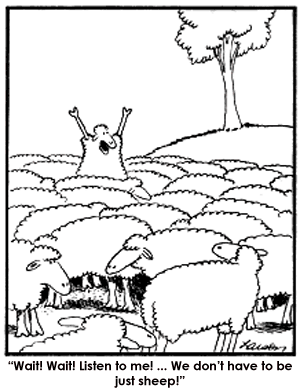Recently the "tone" of my blog was called into question. Before this I can say with absolute honesty that I had given precisely zero thought to the tone I wanted to project from this thinking and writing project of mine. It's not complicated... I have always kept a journal, but the value of sharing my thoughts within the realm of education and the social sciences with people around the world was too enticing not to experiment with. This guy's blog is an action research project designed to idea-tap with anyone who's interested in engaging the conversation... and the conversation never stops in my world- it's ever-changing. That's it.
I don't have an agenda, nor do I intend for this blog to take on a tone. It's an organic project going in a bunch of directions because that's where the conversation leads me. There is no intentional tone. It's a free-flowing place stemming from my belief that change is a constant, not a variable. Trying to manipulate change is a slippery slope in my opinion. Accepting change as a natural process that will happen despite our efforts to control it is the more interesting path. It just keeps leading us around the next bend, and that's exciting to me. I like change; I thrive on it, and I think this perspective benefits me as a teacher and learner.
In today's teaching and learning environments things move so fast; it's hard for teachers to keep up with the social, emotional, political and pedagogical issues. Contemporary (aka 21st Century teaching- a term I'm not fond of,) teaching and learning is not about technology; it's about change. Change is the most pressing challenge in teaching and learning, and also our most brilliant opportunity. I am growing increasingly wary, however, about how some of those invested in education (and virtually everyone seems to have something to say,) perceive change.
There is such a dichotomous aura surrounding the principle of change. We have the old way of doing things, and then there is the new, "better" way that we should aspire to, (according to those who believe strongly that their better way is the only better way.) These change realities as perceived by the opinion and lobby behind them originate from any number of angles, and may or not be properly informed, researched or field-tested. We view change as something that needs to happen before our desired state is achieved. The question begs; what is our desired state?
Let's assume that any given change resulted in an improved educational reality. Does this mean that new reality as framed by a change can be crossed off the list so we can move on to changing the next undesired reality? In my mind this is a grossly unproductive way to view change. Wayne Gretzky is the best hockey player that ever played the game. Interestingly enough he was also the first guy on the ice at every practise, and the last guy to leave. In athletics we understand that change is best framed as perpetual improvement, not as changing realities as we seem to contextualize and understand change in education.
We've created such a frenzy around changing desired educational realities. We've even begun to stratify the process and the people within it. Terms like "edupreneur" and "change agent" are floating around out there to describe those who "get-it" more than the rest of us, as if they are change Jedi's... brave and wise warriors fighting on our behalf to make education somehow better. This is not good. Any true change, positive or negative, has to permeate a culture to be sustained. Creating change hierarchies among educators is exactly the opposite of widespread cultural change. The kind of change we should be talking about in education is cultural change, not changes of state. We need to contextualize change as the perpetual process of doing things better, differently and with more creativity. Once the teacher culture gets this simple principle we will begin to see the organic, creative and fluid environment that is all-of-a-sudden able to reflect the broader global society of the 21st Century.
So let me define the tone of my blog. Wait a minute... I can't. I can't because on any given day I hope it reflects the best thoughts I have in a variety of change (improvement) contexts, and even more importantly those that are shared with me by my network of colleagues that couldn't care less about forcing absolute realities. I can't predict the future, but by accepting change as a constant and quantum element of my role as a teacher and learner, I will be ready to accept it and do my best to flow with it.
There are no perfect realities, but I can fit perfectly in any reality I'm willing to perceive openly and with a constant eye toward improving it.







 l]
l]














